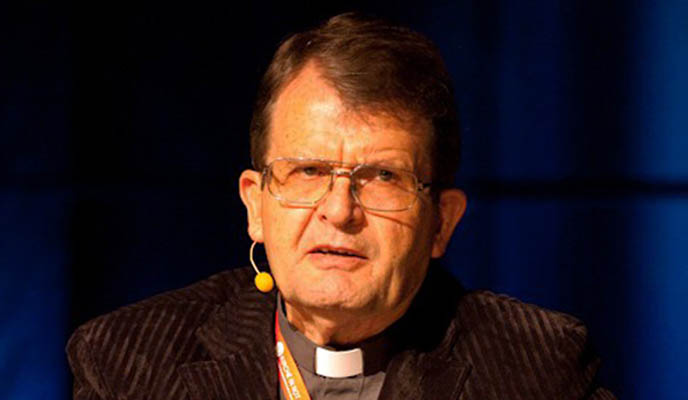
Greed kills. Wars are fought over the hidden treasures of this earth. Oil may “oil” the machinery of one military power, while diamonds and gold fund the fighting machine of the other. “Blood diamonds” devastate a country, they do not build it.
By Fr Oskar Wermter SJ
Businesspeople may commit ritual murders to outdo their rivals through witchcraft. Economies are destroyed and people become paupers because of corruption enriching the so-called “elite”. Luxury mansions are being built while the majority live in hovels and shacks, causing deep social divisions and class conflicts.

The church’s mission is to work towards justice and equity. The prophets of Israel demanded mercy and compassion for widows and orphans and denounced merchants and rich landowners. Jesus warned the rich whose hearts belong to wealth, without mercy for the poor. Have we forgotten the parable of the rich man and Lazarus? Do we not remember Jesus’ saying, “It is easier for a camel to go through the eye of a needle than for someone who is rich to enter the kingdom of heaven” (Luke 18 : 25)?
Again and again in her history great wealth was a threat to the integrity of the Church and the truth of the Gospel. Francis and Dominic in the High Middle Ages preached the Gospel to the poor in self-chosen poverty, which restored the church corrupted by living in luxury and reconciled her to the poor majority.
Preaching against super-capitalism and warning the racketeers of today, alone, does not restore the imbalance between the haves and the have-nots. The gifts of the Creator — food, water, land, animal and plant life, and energy — must not be wasted. It would be an insult to the poor and an outrage to the needy.
The preachers themselves have to live a modest lifestyle and be in solidarity with the needy. Religious communities of sisters and brothers can be found in poor quarters and working with slum dwellers. The words of bishops demanding justice for the poor are fine and necessary, but only the presence of the church among those who live in the shadows makes a real impression.
- Chamisa under fire over US$120K donation
- Mavhunga puts DeMbare into Chibuku quarterfinals
- Pension funds bet on Cabora Bassa oilfields
- Councils defy govt fire tender directive
Keep Reading
Families suffer and break up if they do not share.
Jesus “had nowhere to lay his head”, but he did not live in absolute misery. Women supported him and his disciples “out of their resources” (Luke 8 : 1 – 3). Jesus and the Twelve had a common purse even though the bursar was a “thief” (John 12: 6). The church cannot live from nothing. From the beginning the faithful contributed to the upkeep of the Christian community.
Paul was a tent-maker and supported himself by the work of his hands, but he did not deny that the “worker was worth his wages”. But the “widows and orphans”also belong to the church and part of the offerings must go to them, which must never be forgotten.
The church may ask from her members what is necessary, but she must never become a club for the rich and promote affluence. Paul judges justly: “If we have food and clothing, we shall be content with that. Those who want to be rich are falling into temptation and into a trap and into many foolish and harmful desires, which plunge them into ruin and destruction. For the love of money is the root of all evils.” (1 Timothy 6: 8 – 10).
What the people contribute belongs to the church, not to the pastor. Ministers and church workers need to receive a moderate salary to sustain their families or communities. But everything else belongs to the church and must be administered by trusted members of the congregation. Such a finance committee must make use of the professional expertise of accountants and bankers among the members, provided they are men and women of integrity.
Some members want to get “rich quick” by bidding for church projects and overcharging the community. Let them hear Jesus’ message: “Woe to you who are rich, for you have received your consolation.” (Luke 6: 24). The church is not a dairy cow to be milked by all and sundry.
The real poor must be taken care of. But not necessarily through “free hand-outs”. What are their skills and abilities? Can’t we imbue them with a spirit of initiative and start them off as small entrepreneurs, working for their own upkeep?
Let us not pray so much for prosperity, houses, cars or money-spinning careers, but for the virtue of honesty and the spirit of sharing and generosity so as to increase the welfare of all.
Among religious communities of sisters or brothers (in the Catholic, Anglican and Orthodox churches and some others) income is shared. Salaries, honoraria or stipends go into one common fund. That is their way of driving out the spirit of selfishness and possessiveness, and there must not be any cheating. It is an example for the whole Christian community and indeed society as a whole.
For some people this is quite an attractive idea since it promises security. Famous is the letter of a young boy to his parish priest, “Dear Father, since life is hopeless I have decided to become a priest.”
But a Christian community should not be so much a haven of security, as a community of “men (or women) for others”, sharing not so much in times of prosperity, as in times of need, seeking not private property, but the common good.
Property is not a bad thing, it secures a certain independence. But it has also a social dimension and must be shared. But what belongs to all in the community must also be respected by all.











